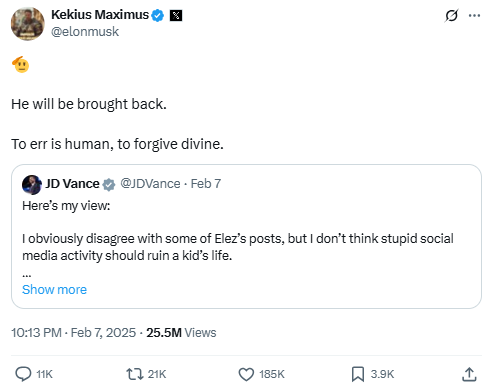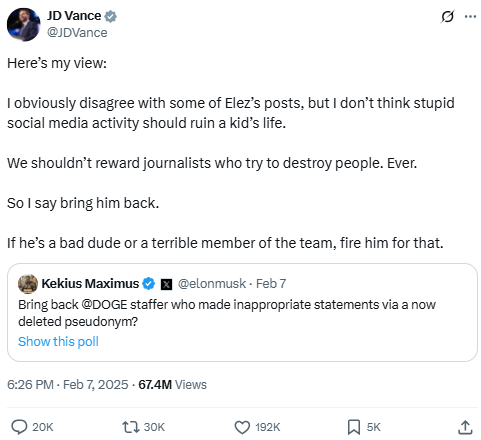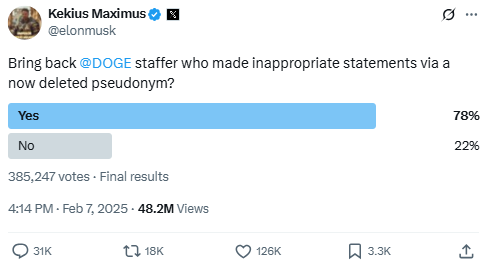Marko Elez, a former employee of the Department of Government Efficiency (Doge), resigned after being linked to a social media account with racist posts. Elon Musk later announced he would rehire Elez, sparking public debate and political responses. The situation raised broader questions about hiring practices, online behavior, and access to government systems.
Elon Musk Reinstates Doge Employee Linked to Racist Posts
Elon Musk has stated he will rehire Marko Elez, a 25-year-old former employee of his newly formed Department of Government Efficiency (Doge), who resigned after being connected to a racist social media account.

Source: https://x.com/elonmusk/status/1887957783783391423
“He will be brought back,” Musk wrote on X, the platform he owns. “To err is human, to forgive divine.”
Elez, who previously worked at SpaceX, was linked by media reports to a now-deleted pseudonymous social media account containing multiple racist posts. The Wall Street Journal first identified the connection, and the BBC verified the posts as authentic.
Examples of the content include:
- “Just for the record, I was racist before it was cool.”
- “You could not pay me to marry outside of my ethnicity.”
- “Normalize Indian hate.”
All the posts have since been removed.

Source: https://x.com/JDVance/status/1887900880143343633
Vice President JD Vance expressed support for Elez, stating: “I obviously disagree with some of Elez’s posts, but I don’t think stupid social media activity should ruin a kid’s life. We shouldn’t reward journalists who try to destroy people. Ever. So I say bring him back. If he’s a bad dude or a terrible member of the team, fire him for that.”
President Donald Trump, when asked about the resignation and Vance’s remarks, said he wasn’t familiar with “that particular thing” but agreed with the vice president’s sentiment. He added that while he was not aware of the details surrounding Marko Elez’s controversial exit from Elon Musk’s Department of Government Efficiency, he would support the decision if JD Vance was in favor of it. “Well I don’t know about that particular thing, but if the Vice President said so… did you say that? (turning to JD), I’m with the VP,” Trump said.
Before confirming Elez’s return, Musk posted a public poll on X asking users if the employee should be rehired. Over 78% of participants voted in favor, according to the poll results.

Source: https://x.com/elonmusk/status/1887867644814020902
Responding to a user who suggested Musk should speak with Elez “about the racist stuff,” Musk replied: “True.”
The incident comes amid increased scrutiny of Doge, the Trump-established advisory group tasked with cutting government costs. The incident comes amid increased scrutiny of Doge, the Trump-established advisory group tasked with cutting government costs. A U.S. judge recently blocked a proposed initiative that aimed to offer incentives to millions of federal workers to resign voluntarily.
Additionally, Musk has supported a plan to dismantle USAID, the U.S. agency for international development. Nearly the entire workforce of about 10,000, including thousands based overseas, is expected to be placed on administrative leave soon.
Earlier reports suggested that Marko Elez had direct access to modify live code in Treasury production systems and held read-write superuser privileges. However, a sworn affidavit from Joseph Gioeli, a longtime federal IT executive within the department, contradicts those claims.
According to Gioeli, Elez’s access was far more limited:
- He used a department-issued laptop with strict security controls;
- He worked only with copies of Treasury source code in a sandboxed environment, not in live production;
- He had read-only access to a payment management database;
- He was mistakenly granted write permissions for one day, but there is no indication he noticed or made use of that access.
Despite these restrictions, a separate court affidavit from senior Treasury official Vona Robinson confirmed that Elez did participate in a system change. Working with staff, he helped implement a feature to flag certain payments for review by the Secretary of State.
Additionally, it was disclosed that only two individuals from the Department of Government Efficiency (DOGE)—Elez and another aide named Krause—were authorized to access and review Treasury IT systems directly.
Conclusion
The decision to rehire Marko Elez has drawn attention to the internal operations of the Department of Government Efficiency and the standards applied to staff conduct. While Elez’s access to sensitive systems was limited, questions remain about oversight and accountability. The public and political responses highlight the ongoing tension between past online behavior and professional opportunities in high-profile roles.






